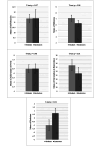A cross-sectional study on personal values of medical students: the differences from their instructors, their associations with mental wellbeing, and the influences of gender
- PMID: 38609919
- PMCID: PMC11010319
- DOI: 10.1186/s12888-024-05695-2
A cross-sectional study on personal values of medical students: the differences from their instructors, their associations with mental wellbeing, and the influences of gender
Abstract
Background: Personal values of Thai medical students have been observed to be diverging from those of their seniors, but the differences remain uncharacterized. Despite its potential association with mental wellbeing, the issue remain unexplored in the population. This study aimed to explore (1) the difference in personal values between medical students and instructors and (2) the association between student's value adherence to mental well-being and the interaction by gender.
Methods: An online survey was performed in 2022. Participants rated their adherence to five groups of values, namely, Self-Direction, Hedonism, Achievement & Power, Universalism & Benevolence, and Tradition. Participants also rated their mental wellbeing. Comparisons were made between the personal values of students and instructors. The association between the personal values of students and their mental wellbeing and the interaction between values and gender were analyzed in linear regression.
Results: Compared to instructors, students rated higher on Universalism & Benevolence, marginally higher on Hedonism, and lower on Tradition. Students' ratings on Self-Direction, Universalism & Benevolence, and Tradition predicted better mental wellbeing. Their rating on Hedonism predicted poorer mental wellbeing, the effect of which was marginally stronger in males. Ratings on Achievement & Power marginally predicted poorer mental wellbeing in females.
Conclusion: Difference in personal values between medical students and instructors have been observed. Some of these values hold potentials over student's mental wellbeing. Curricular and medical school environmental accommodation for the changes in the characters of learners may be necessary to mitigate the adverse effects on their mental wellbeing and foster development of desirable professional characteristics.
Keywords: Medical instructors; Medical students; Mental health; Personal value; Thailand.
© 2024. The Author(s).
Conflict of interest statement
The authors report no conflicts of interest.
Figures
Similar articles
-
Personal values related to primary care specialty aspirations.Fam Med. 1996 Nov-Dec;28(10):726-31. Fam Med. 1996. PMID: 8937875
-
Determination of the Personal Values of the University Students in Different Departments.J Relig Health. 2020 Jun;59(3):1189-1200. doi: 10.1007/s10943-018-0676-1. J Relig Health. 2020. PMID: 30073559
-
Predictors of emotional wellbeing in osteopathic medical students in a COVID-19 world.J Osteopath Med. 2021 Feb 18;121(5):455-461. doi: 10.1515/jom-2020-0272. J Osteopath Med. 2021. PMID: 33694347
-
Healthcare practitioners' personal and professional values.Adv Health Sci Educ Theory Pract. 2016 May;21(2):257-86. doi: 10.1007/s10459-015-9626-9. Epub 2015 Jul 28. Adv Health Sci Educ Theory Pract. 2016. PMID: 26215664 Review.
-
Effectiveness of online mindfulness interventions on medical students' mental health: a systematic review.BMC Public Health. 2021 Dec 18;21(1):2293. doi: 10.1186/s12889-021-12341-z. BMC Public Health. 2021. PMID: 34920715 Free PMC article.
Cited by
-
Short-Form Video Media Use Is Associated With Greater Inattentive Symptoms in Thai School-Age Children: Insights From a Cross-Sectional Survey.Brain Behav. 2025 Jul;15(7):e70656. doi: 10.1002/brb3.70656. Brain Behav. 2025. PMID: 40619997 Free PMC article.
References
-
- Dahlin M, Joneborg N, Runeson B. Stress and depression among medical students: a cross-sectional study. Med Educ. 2005;39:594–604. - PubMed
-
- Goebert D, Thompson D, Takeshita J, Beach C, Bryson P, Ephgrave K, et al. Depressive symptoms in medical students and residents: a Multischool Study. Acad Med. 2009;84:236–41. - PubMed
MeSH terms
LinkOut - more resources
Full Text Sources
Medical


